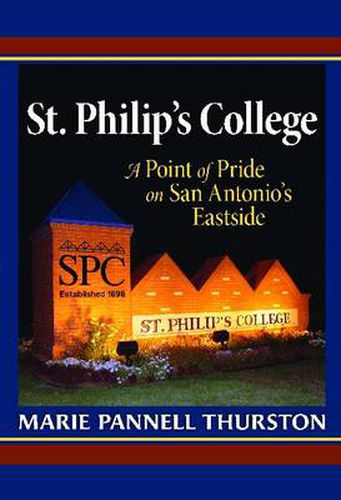Readings Newsletter
Become a Readings Member to make your shopping experience even easier.
Sign in or sign up for free!
You’re not far away from qualifying for FREE standard shipping within Australia
You’ve qualified for FREE standard shipping within Australia
The cart is loading…






In 1898, St. Philip’s Normal and Industrial School opened its doors in San Antonio, offering sewing classes for black girls. It was the inaugural effort in a program, founded by the West Texas diocese of the Episcopal Church, to educate and train former slaves and other African Americans in that city.
Originally tied to St. Philip’s Church, about three miles east of the downtown center, the school grew to offer high school and then junior college courses and eventually affiliated with the San Antonio Independent School District and San Antonio College. One of the few remaining historically black junior colleges in the country, St. Philip’s, whose student body is no longer predominantly black, has also been designated a Hispanic-serving institution, one of few schools to bear both designations.
Known by many as the school that love built, St. Philip’s College claimed in its 1932 catalog, There is perhaps as much romance surrounding the development of St. Philip’s Junior College as there is of the “Alamo City’ in which it is located.
That love story, also containing dominant strains of sacrifice, scarcity, creativity, determination, and pride, finds its full expression in this history by Marie Pannell Thurston. Based on archival research and extensive interviews with current and former alumni, faculty, and friends, St. Philip’s College presents the heartwarming and inspiring record of a school, the community that nurtures it, and the collective pride in what the institution and its graduates have accomplished.
$9.00 standard shipping within Australia
FREE standard shipping within Australia for orders over $100.00
Express & International shipping calculated at checkout
In 1898, St. Philip’s Normal and Industrial School opened its doors in San Antonio, offering sewing classes for black girls. It was the inaugural effort in a program, founded by the West Texas diocese of the Episcopal Church, to educate and train former slaves and other African Americans in that city.
Originally tied to St. Philip’s Church, about three miles east of the downtown center, the school grew to offer high school and then junior college courses and eventually affiliated with the San Antonio Independent School District and San Antonio College. One of the few remaining historically black junior colleges in the country, St. Philip’s, whose student body is no longer predominantly black, has also been designated a Hispanic-serving institution, one of few schools to bear both designations.
Known by many as the school that love built, St. Philip’s College claimed in its 1932 catalog, There is perhaps as much romance surrounding the development of St. Philip’s Junior College as there is of the “Alamo City’ in which it is located.
That love story, also containing dominant strains of sacrifice, scarcity, creativity, determination, and pride, finds its full expression in this history by Marie Pannell Thurston. Based on archival research and extensive interviews with current and former alumni, faculty, and friends, St. Philip’s College presents the heartwarming and inspiring record of a school, the community that nurtures it, and the collective pride in what the institution and its graduates have accomplished.